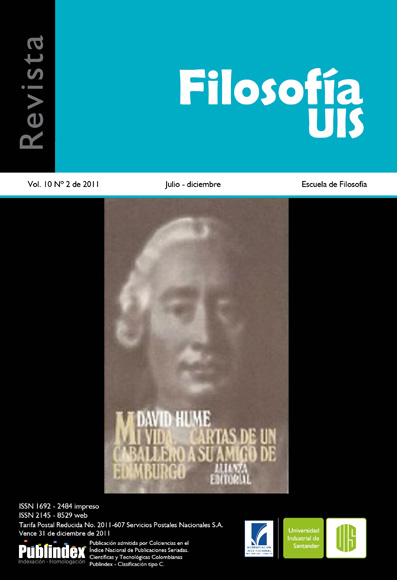The question and the method in the exposition of Aristotle's four causes
Published 2011-10-10
Keywords
- causes,
- theology,
- physics,
- dialectics,
- genealogy
How to Cite
Copyright (c) 2011 Cristina Pérez Díaz

This work is licensed under a Creative Commons Attribution 4.0 International License.
Abstract
We have two different expositions of the four cause’s theory in Aristotle. We find one in Metaphysics A and the other in Physics II, 3. Although they are equal regarding their content, they differ in respect to the form of the exposition. When we ask for the reason of this difference, we can see that although the theory is the same in both places, it is animated by different questions in each place, because it is inside different sciences. The question that is guiding the exposition in Physics looks for the principles of movement, while the one guiding the investigation in the book A of Metaphysics looks for the first universal principles of being qua being, that is the entity, weather sensible or incorruptible. The exposition in Metaphysics A is a dialectical and genealogical one, because the interest is to show the grasp of the final cause and the necessity of it, from where it derives the foundation of theology as a science distinct from physics and as the primary one.
Downloads
References
- “Aristotle on inefficient causes” En: The Philosophical Quarterly, Vol. 32, No. 129, Escocia, Scots Philosophical Asociation, pp. 311-326.
- Aristóteles (1982, 1988). Tratados de lógica, Vols. I y II, Madrid: Gredos.
- Aristotle (1992). Physics Books I and II, Oxford: Clarendon.
- Aristóteles (1994). Metafísica, Madrid: Gredos.
- Aristóteles (1995). Física, Madrid: Gredos.
- Aubenque, Pierre (1961). “Sur la notion aristotélicienne d’aporie”. En: Aristote et les problèmes de méthode, Louvain/Paris: Publications Universitaires/BéatriceNauwelaerts, pp. 3-19.
- Aubenque, Pierre (1962). Le problème de l'être chez Aristote, París: PUF. Aux origines de la philosophie européene. De la pensée archaïque au néoplatonisme, Bruselas: De Boeck
- Evans, Melbourne (1959). “Causality and Explanation in the Logic of Aristotle”. En: Philosophy and Phenomenological Research, Vol. 19, No. 4, Rhode Island: International Phenomenological Society.
- Le Blond, Jacques (1970). Lógique et méthode chez Aristote, París: Vrin.
- Mansion, Suzanne (1961). “Le rôle de l’exposé et de la critique des philosophies antérieures chez Aristote”. En Aristote et les problèmes de méthode, Louvain/Paris: Publications Universitaires/Béatrice-Nauwelaerts, pp. 35-56.
- Oñate, Teresa (2001). Para leer la Metafísica de Aristóteles en el siglo XXI, Madrid: Dykinson.
- Oñate, Teresa (2004). El nacimiento de la filosofía en Grecia. Viaje al inicio de occidente, Madrid: Dykinson.
- Owen, G. E. L. (1961). “Tithénai tà phainómena”. En Aristote et les problèmes de méthode, Louvain/Paris: Publications Universitaires/Béatrice-Nauwelaerts, pp. 83-103.
- Ross, W. D. (1975). “The Development of Aristotle's Thought”. En J. Barnes et al. (eds.), Articles on Aristotle, Vol. 1, Londres: Duckworth, pp. 1-13.
- Vogel, C. J. de (1961). “La méthode d’Aristote en métaphysique d’aprés Métaphysique A I-2”. En Aristote et les problèmes de méthode, Louvain/Paris: Publications Universitaires/Béatrice-Nauwelaerts, pp. 147-170.
- Weil, E. (1975). “The Place of Logic in Aristotle's Thought”. En J. Barnes et al. (eds.), Articles on Aristotle, Vol. 1, Londres: Duckworth, pp. 88-112.
